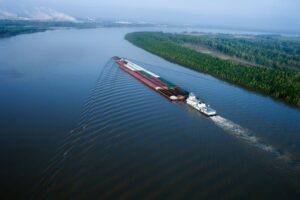Last Updated on May 7, 2025 by SEO Rankings
If you’re a maritime worker, chances are you’ve heard the term “navigable waters” tossed around in the context of the Jones Act. But what does it really mean?
The phrase might seem straightforward, but it greatly determines whether the Jones Act covers you. If you’ve suffered an injury while working on a vessel, understanding whether you were working on navigable waters is vital to protecting your rights and getting the compensation you deserve.
A maritime accident lawyer can figure out whether your accident happened in navigable waters. However, before you start the legal process, it’s helpful to understand what the term means and how it affects your claim.
What Qualifies as Navigable Waters?
When you hear “navigable waters,” you might picture oceans, seas, and rivers. While that’s partly accurate, the legal definition of navigable waters in the context of the Jones Act is more complex. Navigable waters, under U.S. law, refer to bodies of water that are used or can be used for interstate or foreign commerce. Navigable waters are basically waterways suitable for commercial shipping.
But it’s not just about the current use of a waterway. Even if a river or lake isn’t actively being used for commerce, it can still be considered navigable if it has the potential to be used for transporting goods or passengers. This distinction is key in Jones Act claims because it broadens the scope of what counts as navigable waters and makes more maritime workers eligible for compensation.
Navigable Waters and the Jones Act
The Jones Act, also known as the Merchant Marine Act, is a federal law that provides a legal pathway for injured maritime workers to seek compensation and justice for job-related injuries. The Jones Act allows injured seamen to file a negligence lawsuit against their maritime employers for work-related injuries.
To qualify for a Jones Act claim, an individual must meet the definition of a seaman, which includes contributing to the function or mission of a vessel and spending over 30% of their time on navigable waters. The Jones Act provides extra protection to vulnerable crew members and other maritime employees, ensuring they receive fair compensation for their injuries.
Lakes, Rivers, and the Gray Area of Navigable Waters
You might think that only ocean-going vessels qualify under the Jones Act, but navigable waters can also include lakes and rivers. Inland waterways used for commercial purposes are just as important in Jones Act claims as the high seas. For instance, the Mississippi River, which plays a huge role in U.S. commerce, is navigable waters under the Jones Act.
Where it gets tricky is in determining whether smaller bodies of water qualify. If a lake or river is landlocked and does not connect to other navigable waters, it may not count. This means that even if a worker suffers an injury on a vessel in a large lake, they might not be covered under the Jones Act unless that lake can connect to other waterways used for commerce. That’s where a maritime accident lawyer comes in handy – they can determine if the waters where your accident occurred are navigable under the law.
Man-Made Canals and Navigable Waters
It’s easy to overlook man-made structures like canals when considering navigable waters, but they often qualify under the Jones Act. Canals, like natural rivers, are vital for moving commercial goods. For example, the Erie Canal in New York is one of the most famous man-made waterways and is considered navigable. If you’re working on a vessel traveling through a man-made waterway like this and you’re injured, you’re likely covered by the Jones Act.
Similarly, other canals that connect major bodies of water or facilitate commercial shipping are considered navigable. This expands the definition of navigable waters far beyond oceans and seas, giving more maritime workers protection under the law.
Offshore Platforms and Navigable Waters
If you work on an offshore oil rig or platform, you might wonder if the Jones Act covers you. The answer depends on whether the platform is located on navigable waters. Offshore platforms are a bit of a gray area regarding Jones Act claims. Some workers on oil rigs are considered seamen under the Jones Act, but only if the platform is located on navigable waters and the worker spends significant time aboard a vessel connected to the platform.
For instance, if you’re regularly transported to and from an oil rig by boat and spend time working on the boat, you might qualify as a seaman. A maritime accident attorney can determine if your work on an offshore platform meets the definition of “seaman” under the Jones Act and whether the waters around the platform are navigable.
What About Harbors and Docks?
Harbors and docks are areas where maritime workers frequently spend their time, but are they considered navigable waters? Harbors are often considered navigable because they serve as gateways to the open sea or other commercial waterways. If you’re working on a vessel docked in a harbor, your injuries would likely fall under the Jones Act.
However, docks themselves are not usually considered navigable waters. If your accident happens on a dock or pier, the Jones Act may cover you. But you may still have a valid claim if the injury occurs while you’re boarding or disembarking from a vessel on navigable waters.
The Significance of “Tidal” vs. “Non-Tidal” Waters
Tidal and non-tidal waters are another way to categorize bodies of water, and understanding the distinction can affect whether the Jones Act applies to your case. Tidal waters are those affected by ocean tides, including seas, oceans, and large coastal rivers. These waters are almost always considered navigable under the Jones Act due to their connection to major commercial shipping routes.
Non-tidal waters, on the other hand, can be trickier. These are inland bodies of water that don’t experience the rise and fall of tides, such as landlocked lakes and rivers that don’t connect to the sea. In some cases, non-tidal waters may still be considered navigable, especially if they play a role in transporting goods within the country.
For example, large rivers like the Mississippi River are non-tidal in many parts, but they’re still navigable because of their commercial importance. On the other hand, a small lake in a remote area that doesn’t connect to any other waterways and isn’t used for commerce will likely not qualify as navigable waters under the Jones Act.
How Does the Jones Act Protect You?
Now that you know what qualifies as navigable waters, let’s dive into how the Jones Act protects you. The Jones Act is a federal law that gives seamen the right to seek compensation for injuries caused by their employer’s negligence. To be eligible for protection under the Jones Act, you must meet three key criteria:
- You must be classified as a seaman
- Your employer must be negligent
- Your injury must have occurred while working on navigable waters
If you’re injured while working on a vessel in navigable waters, you can file a claim under the Jones Act to recover damages for medical expenses, lost income, pain and suffering, and more. The Act provides greater protection than typical workers’ compensation laws, which is why it’s so important to understand whether you qualify for Jones Act benefits.
Understanding Jones Act Jurisdiction
One of the biggest impacts of the definition of navigable waters is how it shapes the jurisdiction of the Jones Act. The law was designed to protect seamen who work on U.S. vessels, and this protection only extends to vessels operating on navigable waters. If your injury occurred while working on a vessel in waters that aren’t classified as navigable, you won’t be eligible to file a claim under the Jones Act.
But what if the waters where you suffered an injury are in a foreign country or international waters? The Jones Act can still apply if you’re working on a U.S.-flagged vessel and the injury occurred while performing your duties. This global reach is another reason why understanding navigable waters is essential. The Jones Act doesn’t just cover U.S. territorial waters; it can also extend to vessels operating in international waters, as long as they’re used for commercial purposes and are registered in the United States.
Commercial Use in Navigable Waters
It’s important to remember that navigable waters aren’t just defined by their size or location – they must also be used for commercial purposes. If a body of water is theoretically navigable but not used for commerce, it may not qualify under the Jones Act.
For example, a small river that flows into a larger river system might seem like navigable waters, but it may not be covered if it’s not actively used for commercial transport. On the other hand, a river or canal that’s frequently used by barges or cargo ships would certainly be considered navigable.
Vessel Status and Navigable Waters
Not only do you need to be working on navigable waters to file a Jones Act claim, but the vessel you’re working on also needs to meet certain criteria. To qualify as a vessel under the Jones Act, it must be capable of moving through navigable waters. This includes ships, boats, barges, and even floating platforms in some cases.
It’s not enough for the vessel to simply float on water. It must be used for transportation on navigable waters. So, if you’re working on a fixed platform or structure permanently attached to the seafloor, it may not count as a vessel under the Jones Act, even if it’s located on navigable waters.
Seasonal and Temporary Waterways
Another unique aspect of navigable waters is that they can include seasonal or temporary waterways. If a river only becomes navigable during certain times of the year due to seasonal flooding, it can still be considered navigable under the law as long as it’s used for commerce during those times.
Temporary waterways created by flooding or other natural events can also be classified as navigable, but again, only if they’re being used for commercial purposes. This can be a tricky area of the law, so it’s important to consult with a maritime accident attorney if you’re unsure whether the waters you worked on qualify as navigable.
The Importance of Determining Navigability
You might be wondering why all this matters. If you’re injured while working on a vessel, isn’t it obvious that you should be compensated?
The reality is that determining whether you were working on navigable waters can make or break your case. Since the Jones Act only covers seamen injured while working on vessels in navigable waters, you can lose out on compensation if the body of water where your accident occurred doesn’t meet the legal definition.
That’s why it’s important to understand how navigable waters are defined and to work with a maritime accident lawyer to help you build a strong case. Determining whether the waters where you suffered an injury qualify as navigable will give you a better chance of securing the compensation you’re entitled to.
How Court Rulings Have Shaped the Definition of Navigable Waters
Numerous court rulings have shaped the definition of navigable waters over the years. The courts often look at a body of water’s historical uses to determine whether it qualifies as navigable under the Jones Act. For instance, a court might examine whether a lake or river was used for commerce in the past, even if it’s not actively used today.
These rulings have widened the scope of what counts as navigable waters, meaning more workers can be protected under the Jones Act. At the same time, they’ve also narrowed the definition in certain cases, especially when it comes to inland waters that have limited commercial use.
Courts often rely on the “reasonable potential for commercial use” standard, which means that even if a body of water isn’t being used for commerce right now, it can still be classified as navigable if it can reasonably support commercial activity in the future. This future-looking perspective ensures that the Jones Act remains relevant even as the uses of waterways change over time.
Let a Skilled Maritime Accident Lawyer Deal With the Complexities
Understanding whether your accident occurred on navigable waters is important for building a strong case and ensuring you get the compensation you deserve. Whether you were working on a large ocean-going vessel, a river barge, or an offshore platform, your ability to file a claim under the Jones Act depends on the navigability of the waters where you suffered an injury.
By working with a maritime accident lawyer from The Young Law, you can protect your rights and pursue the best possible outcome for your case. Don’t hesitate to contact an attorney experienced in maritime law to schedule a free consultation.




